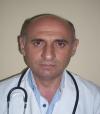What Causes Chronic Obstructive Pulmonary Disease?

 Mon, 28 Apr 2014
Answered on
Mon, 28 Apr 2014
Answered on
 Thu, 15 May 2014
Last reviewed on
Thu, 15 May 2014
Last reviewed on
Chronic Obstructive Pulmonary Disease...
Detailed Answer:
Hi.
I have gone through your query and I understand your concerns.
Basing on your medical history and on your symptoms, I can say that you suffer from Chronic Obstructive Pulmonary Disease(COPD).
Factors that causes COPD are many and different, but I think that the initial cause of COPD is aspiration pneumonia, that is caused by Gastroesophageal Reflux Disease.
To confirm the diagnosis you need:
- Pulmonary X-ray.
- Chest Ct-scan.
- Sputum culture.
- Spirometry(respiratory test).
- Analysis of arterial blood, to determine the need for oxygen.
- Complete blood count.
- International normalized ratio test(INR test), to exclude pulmonary embolism.
The results of these test will confirm the diagnosis for COPD.
You should avoid polluted environments to relieve cough and you should elevate the head of your bed in order to avoid reflux.
The treatment will contain macrolide antibiotic(when cough is aggravated), Bronchodilators and expectorant medicines.
Basing on the results of the above tests, your doctor will determine the medicines and the dosage that you need.
Contact your pulmonologist.
Ask me for anything unclear.
All the best.
Dr. Behar.

Cardiac insufficiency(Heart failure)...
Detailed Answer:
Thank you for writing back.
If you have been tested and the results has shown that you don't suffer from COPD, then the other possibility is that you suffer from cardiac insufficiency(heart failure), more exactly right ventricular failure.
I think so, because heart failure is a complication of hypothyroidism, because hypothyroidism raises cholesterol and low density lipoprotein level and when these levels are raised heart complications are appeared.
To confirm the diagnosis you need the following tests:
- Chest X-ray.
- Echocardiography.
- Electrocardiogram(ECG test).
- Complete blood count.
- Blood test, including electrolytes (sodium , potassium) and C-reactive protein.
- Liver function test.
Consult your cardiologist.
If you do not have any clarifications, you can close the discussion and rate the answer.
Wish you good health.
Dr. Behar.
Answered by

Get personalised answers from verified doctor in minutes across 80+ specialties



